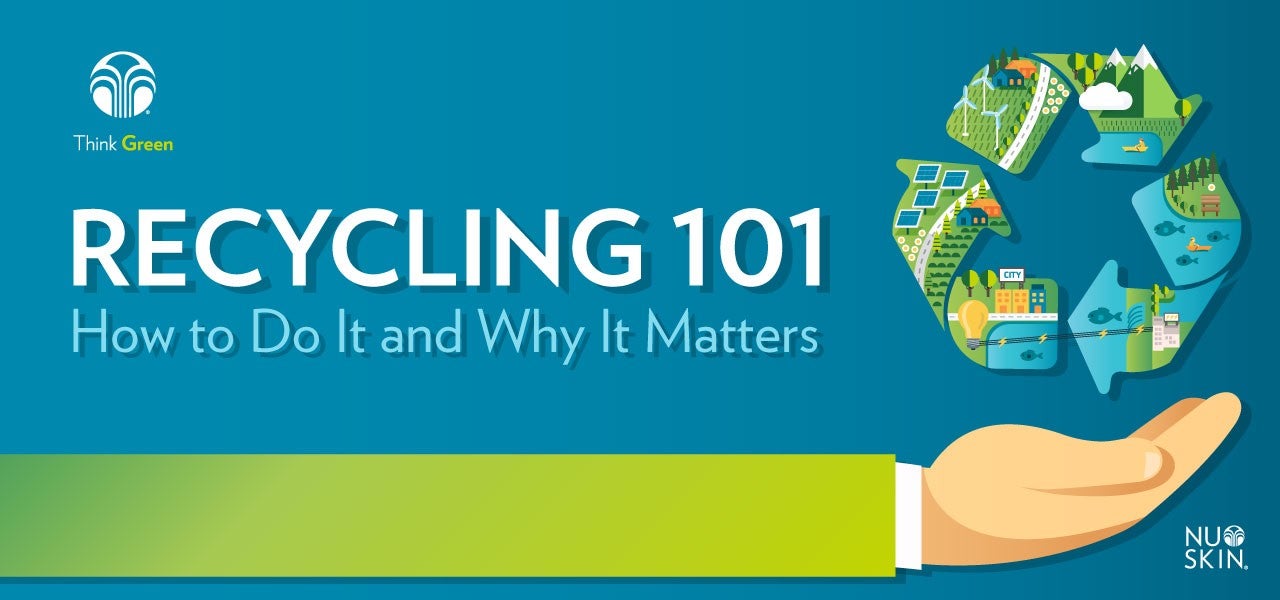Recycling 101: How to Do It and Why It Matters
April 22, 2019

Throughout the past century, the world has seen a tremendous surge in garbage. Individually-packaged food servings have taken off and the convenience of having everything from mattresses to groceries delivered to our doorsteps means even more paper, bags, and boxes in circulation.
Corporate waste is also apart of the problem. Offices generate substantial amounts of trash — especially from paper. With only about 53.4% of paper products being recycled in the U.S., Americans are throwing away about one billion trees worth of paper every year.1
Benefits of Recycling

Fortunately, you don’t have to be a superhero to help save the world — recycling is within everyone’s powers. Years of research prove recycling makes a world of difference in preventing pollution, saving energy, and conserving natural resources. It even helps create jobs within the recycling and manufacturing industries.
Additionally, items made from recycled materials have already been refined and processed, so it takes much less energy and fewer resources to manufacture them a second time.
Consider this: The average American uses about seven trees worth of paper, wood, and other products every year.2 By simply using less paper and recycling everything we do use, we could reduce our impact on forests, save energy, produce less waste, limit pollution, and even help end human rights abuses linked to paper production around the world.
In case you still need some extra motivation, here are some more recycling fun facts:
The amount of lost energy from throwing away things that could be recycled is equivalent to the annual output of 15 power plants.3
One recycled glass bottle saves enough energy to light a 100-watt light bulb for four hours.4
Plastics require 100 to 400 years to break down at the landfill.5
Producing glass from original materials requires 30% more energy than producing it from crushed, used glass.6
Preventing one ton of paper waste saves between 15 and 17 mature trees.7
why corporations should recycle
The amount of waste in offices is astonishing. When corporations recycle that means less wastes to the landfill and less overall harm to the environment. There are many advantages of recycling business waste including: environmental benefits, improved business reputation, reduced costs, and energy savings.
Think about the waste at corporate offices -- the paper, garbage and plastic water bottles. One simple way to get employees thinking about the environment is to implement Think Before You Print strategies. Have systems in place that alert the employee if printing is necessary. Just having employees think about their actions will result in cost savings.
Simple Ways you can recycle at home and at work
Hopefully now you’re convinced that recycling is important, so let’s explore how easy it is to do. It’s a common myth that figuring out what can and cannot go in the recycling bin is a complicated mystery, but here are some simple things you can do every single day to make a positive impact on our environment:
1. Toss these items into a recycling bin instead of a garbage can:
Cardboard
Newspaper
Paper
Unsoiled food boxes
Beverage cans
Food cans
Plastic bottles and caps
2. Use a reusable water bottle and bring your own silverware and cups to work instead of using disposable items each day.

How Nu Skin Recycles
Nu Skin is committed to reducing, reusing, and recycling as much as possible. Each one of our employees is given their own recycling bins and reusable water bottles and encouraged to reduce paper usage. In 2018, we recycled 179 tons of paper at our Provo, Utah campus. At our in-house restaurant, The Spoon, we only use paper and plastic that is reusable or recyclable.
LET'S ALL DO OUR PART
It is up to all of us to limit our use of disposable materials and recycle everything we can. As recycling awareness increases, it only gets easier to find recycling bins and access reusable materials. Each time you wish to get rid of an item throughout the day, take a second to consider whether it could be recycled or reused. You could be helping someone keep their job, saving thousands of kilowatt hours of energy, or even keeping a tree standing for the next generation.
Sources
1. https://www.usi.edu/recycle/paper-recycling-facts/
2. http://www.recycling-revolution.com/recycling-facts.html
4. https://archive.epa.gov/epawaste/conserve/smm/wastewise/web/html/factoid.html
5. https://archive.epa.gov/epawaste/conserve/smm/wastewise/web/html/factoid.html
6. https://archive.epa.gov/epawaste/conserve/smm/wastewise/web/html/factoid.html
7. https://archive.epa.gov/epawaste/conserve/smm/wastewise/web/html/factoid.html
YOU MIGHT ALSO LIKE:
-
Thanks to the invention of modern technologies, and the “always connected” culture of the world, we have sacrificed sleep to stay connected. In a recent study conducted by the CDC, they found that 1 in 3 adults (35%) don’t get the minimum recommended 7 hours of sleep each night1. This lack of sleep can lead to many physical problems ranging from increased stress, to problems with cognition and mem...
-
Embarking on a journey to another country can be an experience of a lifetime. But it can also be stressful if you aren’t prepared. So, start planning, follow these 13 travel savvy tips, and get ready to explore the world worry-free!

